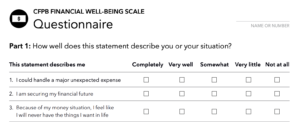Is a high income all that’s needed to be financially well? Well, not exactly. While a higher income might be helpful, it doesn’t necessarily mean you’ll have greater financial well-being. This is because financial well-being has more to do with how you save and spend your money, than with how much money you make.
So, how do you know if you’re financially well? Because personal finance affects so many aspects of our lives, it can actually be pretty hard to measure. Luckily, the CFPB did some research to help us understand what makes us financially well.
According to the CFPB, “financial well-being can be defined as a state of being wherein a person can fully meet current and ongoing financial obligations, can feel secure in their financial future and is able to make choices that allow enjoyment of life.”
In other words, financial well-being is about being able to pay for all current expenses, save for unexpected expenses, save for retirement, and enjoy life.
To help people assess their financial well-being, the CFPB created a survey. The average score of survey respondents was 54. To get a better idea of how the average American answered the questions about their financial well-being, we tried to score 54 as well. This was achieved by answering somewhat to most questions (see an example of the questionnaire below).

We opted to use NerdWallet’s online survey vs the worksheet provided by the CFPB, so we got this message at the end:
May struggle with financial insecurity. 32% of people with scores in the 51 to 60 range report difficulty making ends meet. 21% report material hardships such as running out of food (or worrying about it), inability to afford a place to live or medical care, or having utilities turned off.
The questions don’t mention credit scores or level of income. Instead, they focus on things like money available for unexpected expenses and comfort level with current savings. It makes sense then, that our middle of the road answer to all of these questions yielded this result. Although a person may be doing “okay” financially, they might struggle with financial insecurity.
Underneath our financial well-being score, Nerdwallet provided some tips to improve financial well-being. Saying, “the CFPB findings highlight that a safety net of savings has a strong influence on financial stability.” In other words, the number one predictor of financial well-being is a safety net of savings. They recommended building an emergency fund, setting up a budget, and paying down debt as our next steps. And we totally agree with them.
But what if our employees don’t have a safety net of savings? How can they feel financially secure if they’re just getting by?
These days employers need to be aware that even if they’re offering fair wages, their employees may be financially insecure. Financial wellness programs that provide access to emergency funds can help. These programs allow employees to feel financially secure right away while giving them time to build an emergency fund. That extra bit of support could be the difference between being financially well or being financially insecure.
